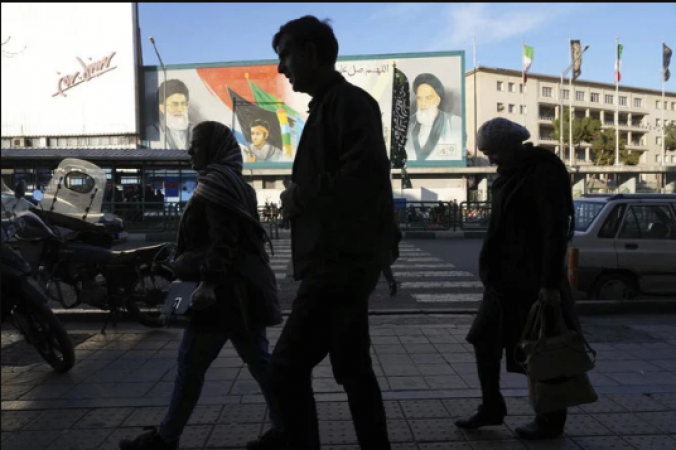
Nicosia: Iran's Islamic clerical regime has struggled to respond to months of unprecedented protests, swinging between repression and actions it sees as appeasement efforts to quell the unrest.
According to Nader Hashemi, director of the Center for Middle East Studies at the University of Denver, "the conflicting messages we are getting from the Iranian regime suggest an internal debate on how to deal with the ongoing protests."
He said there are hawks and pigeons who disagree about how repressive the government should be during a crisis "as in most authoritarian regimes". The retrials of several protesters on death row and the release of well-known dissidents are signs that some are trying to take a more moderate stance.
Also Read: Prestigious US attorney who supports Israel opposes legal reform
But on Saturday, Iran executed two people for killing a member of a paramilitary force during protest-related unrest, a reminder of the hardline stance.
The protests began after the death of Kurdish-Iranian Mahsa Amini (22) in custody on 16 September. She was detained by the morality police, which maintains a strict dress code that requires women to cover their necks and hair like a scarf.
The protests turned into protests to overthrow the Islamic government, becoming the biggest challenge to the clerics since the 1979 revolution that overthrew the shah.
Hundreds of people have died as a result of the officers' deadly violence in retaliation. Thousands have been detained, many accused of killing or attacking members of the security forces, and 14 of them have been sentenced to death, according to the judiciary.
Also Read: Iran is detained in Germany on suspicion of planning a chemical attack
Four people have now been sentenced to death, some death sentences have been upheld by the Supreme Court. The legal system has also announced new trials for six of the fourteen.
Iran expert Mehrzad Borojerdi, co-author of "Post-Revolutionary Iran: A Political Handbook", based in the US, claimed that this reflected a "political calculation".
"They know that mass executions will enrage the public and draw more people to the streets. On the other hand, they want to intimidate people by demonstrating their willingness to put protesters to death."
Majid Tavakoli and Hossein Ronaghi, two prominent dissidents who were detained during the protests in what analysts believe was another attempt to calm the situation, were released weeks later. Earlier, Ronaghi was fasting.
Everything from long prison terms and executions to pressure-relieving valves are being used by the regime. According to Borojerdi, they are using these as they work to develop a more precise policy.
The re-testing is the result of mounting domestic and international pressure, according to Durham University's Anoush Ehteshmi, director of the Institute for Middle Eastern and Islamic Studies.
However, according to Ehteshmi, there is disagreement within the regime about how to handle this, with hardliners on the one hand and those who believe the executions only serve to strengthen the resistance.
Retrials and the release of political prisoners are "appeasement measures" meant to "throw a bone" at the protesters, he continued.
From the point of view of a "securitized, crisis-ridden regime ... they feel they are being lenient and responding to public pressure," even though such actions may seem insignificant.
Celebrities have also been detained, although often for very short periods of time. Noted actor Taraneh Alidosti was released on bail on Wednesday after being detained for nearly three weeks because of his support for the protests, according to his lawyer.
The hold-and-release strategy is regarded by some analysts as intimidation, but Hashemi claims it is also a means by which the regime is "testing the waters" and gauging public opinion. Used to be.
According to Afsheen Shahi, an associate professor of Middle Eastern studies at Keele University in the UK, the "softness" sometimes shown by the authorities is "an attempt to prevent further factionalism within the security establishment" because some of its members are disenchanted with it. It is done. Bloody violence.
In response to the public outcry, the regime "doesn't seem to have a clear strategy," he continued. Other well-known people have spent months in jail despite some of their releases. Longtime activist Arash Sadeghi and two Iranian journalists who contributed to exposing Amini's case are among them.
According to Prosecutor General Mohamed Jafar Montazeri, the ethics police were "abolished" in early December. However, no one else has confirmed this.
According to Hashemi, the announcement reflects the internal discussion and demonstrates that "at least one section of the ruling regime" supports a less severe approach to enforcing the female dress code.
Also Read: Mexico City subway train collision results in 1 fatality and 57 injuries
Ehteshami claims that some people in positions of power "are now starting to talk about a compromise," though it is still too early to know what that would entail.
However, he claimed that in general, "I don't think they have what the people want," which is radical change, the specifics of which have not been established.
But according to Hashemi, the regime has historically demonstrated the capacity to "make concessions when it has to." People often overlook the fact that this regime has endured for 44 years because of how cunning, intelligent, and Machiavellian it can be in its survival strategies.